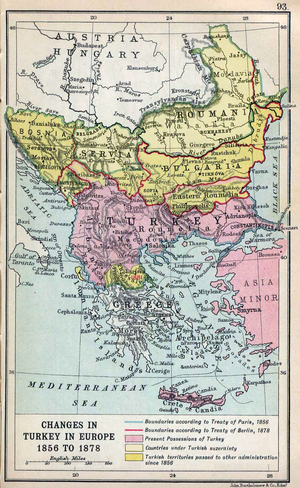
Back معاهدة برلين (1878) Arabic Berlin müqaviləsi (1878) Azerbaijani Берлински договор Bulgarian Berlinski sporazum (1878) BS Tractat de Berlín (1878) Catalan Berlínská smlouva (1878) Czech Berlin-traktaten (1878) Danish Berliner Vertrag von 1878 German Συνθήκη του Βερολίνου (1878) Greek Tratado de Berlín (1878) Spanish
| Treaty between Austria-Hungary, France, Germany, Great Britain and Ireland, Italy, Russia, and the Ottoman Empire, for the Settlement of the Affairs of the East | |
|---|---|
 Southeastern Europe after the Congress of Berlin | |
| Context | Congress of Berlin, after the Russo-Turkish War of 1877–1878 |
| Signed | 13 July 1878 |
| Location | Berlin, German Empire |
| Parties | |
The Treaty of Berlin (formally the Treaty between Austria-Hungary, France, Germany, Great Britain and Ireland, Italy, Russia, and the Ottoman Empire for the Settlement of Affairs in the East) was signed on 13 July 1878.[1][2] In the aftermath of the Russian victory against the Ottoman Empire in the Russo-Turkish War of 1877–1878, the major powers restructured the map of the Balkan region. They reversed some of the extreme gains claimed by Russia in the preliminary Treaty of San Stefano, but the Ottomans lost their major holdings in Europe. It was one of three major peace agreements in the period after the 1815 Congress of Vienna. It was the final act of the Congress of Berlin (13 June – 13 July 1878) and included the United Kingdom, Austria-Hungary, France, Germany, Italy, Russia and the Ottoman Empire. Chancellor of Germany Otto von Bismarck was the chairman and dominant personality.
The most important task of the Congress was to decide the fate of Bulgaria, but Bulgaria itself was excluded from participation in the talks, at Russian insistence.[3][4] At the time, as it was not a sovereign state, Bulgaria was not a subject of international law, and the same went for the Bulgarians themselves. The exclusion was already an established fact in the great powers' Constantinople Conference, which had been held one year before without any Bulgarian participation.
The most notable result of the conference was the official recognition of the newly independent states of Romania, Serbia, and Montenegro (which had de facto been acting independently for decades). Furthermore, Russia regained access to the formerly demilitarised Black Sea region.
- ^ Hertslet, Edward (1891), "Treaty between Great-Britain, Austria-Hungary, France, Germany, Italy, Russia, and Turkey, for the Settlement of Affairs in the East, Signed at Berlin, 13th July 1878 (Translation)", The Map of Europe by Treaty; which have taken place since the general peace of 1814. With numerous maps and notes, vol. IV (1875–1891) (1st ed.), London: Her Majesty's Stationery Office, pp. 2759–2798, retrieved 8 February 2019 – via Internet Archive
- ^ Phillips 1911.
- ^ Krasner, Stephen D. (1999). Sovereignty: Organized Hypocrisy. Princeton University Press. p. 165. ISBN 0-691-00711-X.
- ^ Bourchier, James David (1911). . In Chisholm, Hugh (ed.). Encyclopædia Britannica. Vol. 04 (11th ed.). Cambridge University Press. pp. 779–784.
Political History